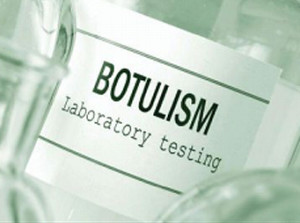Botulism in Horses
Click here to read the complete article456 – October, 2016
BY HEATHER SMITH THOMAS
 Botulism is a highly fatal disease caused by toxins produced by spore-forming bacteria (several types of Clostridium botulinum) found in the environment, generally in the soil. These bacteria often live harmlessly in the digestive tracts of plant-eating animals such as horses and cattle but generally do not cause disease except under certain conditions in which they multiply and create toxins. Botulism causes “shaker foal syndrome” in which affected foals become weak and collapse, and can also be deadly to adult horses.
Botulism is a highly fatal disease caused by toxins produced by spore-forming bacteria (several types of Clostridium botulinum) found in the environment, generally in the soil. These bacteria often live harmlessly in the digestive tracts of plant-eating animals such as horses and cattle but generally do not cause disease except under certain conditions in which they multiply and create toxins. Botulism causes “shaker foal syndrome” in which affected foals become weak and collapse, and can also be deadly to adult horses.
Amy Johnson, DVM, DACVIM (Large Animal Internal Medicine, New Bolton Center in Pennsylvania) says these bacteria produce a neurotoxin which is considered the most potent and deadly toxin known to man. “The interesting thing is that these bacteria are present in the soil all across the U.S. They only produce the toxin if conditions are right, and the most important factor is lack of oxygen. There are also some pH and moisture constraints, but the biggest factor is an anaerobic environment with very low oxygen levels,” she explains. This is similar to the conditions that aid toxin formation in other Clostridial diseases like tetanus, blackleg, malignant edema, etc.
“Horses most commonly develop botulism when they ingest the toxin in feed material, usually forage. The most common type of forage where botulism might be a risk would be hay in big bales that were either harvested too moist or stored improperly. The inner parts are
wet and spoil, creating the ideal conditions of moisture and low oxygen environment,” she says.
“Horses can also get the disease from eating improperly processed silage or haylage. Horses historically have generally not been fed silage, haylage, or haylage in bales, but when hay prices are high, some people try these feeds and run into problems,” says Johnson.
Click here to read the complete article456 – October, 2016










